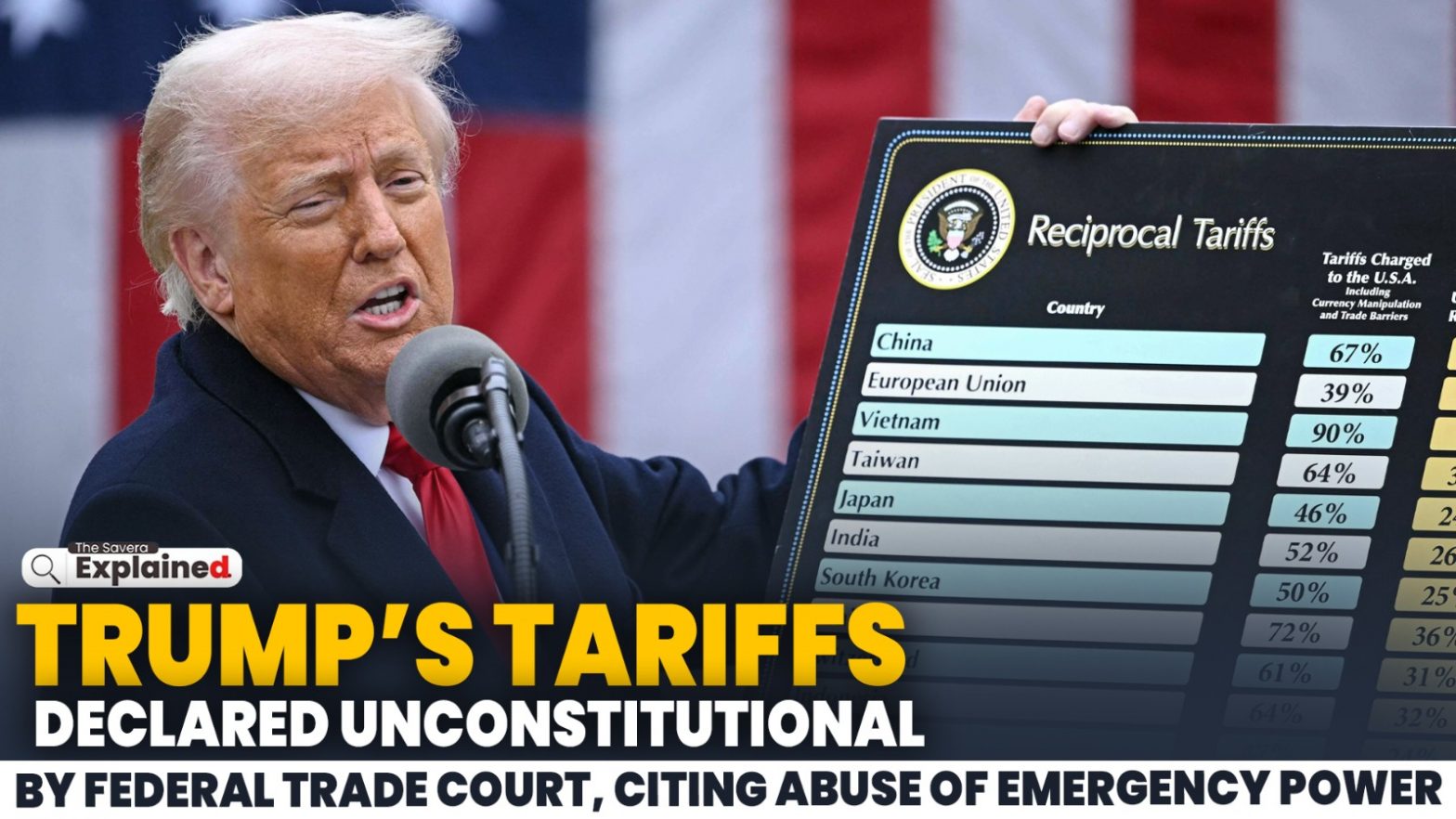
The U.S. Court of International Trade in Manhattan ruled President Donald Trump’s tariffs unconstitutional, stating he misused the International Emergency Economic Powers Act (IEEPA).
The three-judge panel found Trump exceeded his authority, as the Constitution assigns tariff powers to Congress, and the IEEPA does not permit tariffs without a valid national emergency, which was not adequately justified.
The tariffs, including a 10% global tariff and higher rates on China, Canada, and Mexico, were halted by a permanent injunction. The ruling is under appeal, with potential implications for executive power and trade policy.
The verdict was given on the basis of two cases:
Both argued that the tariffs were causing huge losses to small businesses because their costs were increasing due to the increase in the price of imported goods. The court accepted these arguments and said that the President did not have the constitutional authority to impose such a large-scale tariff.
The Court’s Ruling
On May 28, 2025, a U.S. Court of International Trade panel ruled that President Trump’s tariffs were illegal. The court stopped their enforcement permanently, saying he went beyond his legal powers.
Constitutional Limits on Tariff Authority
The U.S. Constitution gives Congress—not the president—the power to impose tariffs. The court said Trump broke this rule by acting without Congress’s approval.
Misuse of the IEEPA
Trump used the International Emergency Economic Powers Act (IEEPA) to justify the tariffs. But the law is meant for emergencies like national threats, not regular trade issues. The court said trade deficits and drug trafficking didn’t qualify as valid emergencies.
Nondelegation Doctrine
The court also said even if the IEEPA allowed tariffs, giving that much power to the president would be unconstitutional. Congress can’t hand over such authority without clear rules.
Economic and Legal Implications
Most tariffs under the IEEPA, including those on China, Canada, and Mexico, were struck down. Other tariffs under different laws still apply.
Reasons for the Court’s Decision
Trump overstepped his powers, used weak reasons for emergency, misused the law, and hurt businesses. The court defended the law and the role of Congress. The Trump team plans to appeal.
The Trump administration will appeal the court’s decision
The Trump administration has said that it will immediately appeal this decision. Trump claimed on his social media site that his tariff policy was necessary to “make America great again”. Although the court suggested that Trump could impose tariffs of up to 15% for 150 days under Section 122 of the Trade Act 1974, but this also requires solid grounds.
On April 2, Trump imposed tariffs on many countries around the world
This is to be noted that on April 2, 2025. President Trump imposed sweeping tariffs on countries including China, Canada and Mexico. The tariff on these countries includes a 10% across-the-board tariff on most trading partners, higher tariffs (20-25%) on countries like China, Canada, and Mexico, and specific tariffs aimed at addressing issues like trade deficits and fentanyl trafficking.
He referred these announcements as “Liberation Day” tariffs, and said these were necessary to address national emergencies, such as persistent trade deficits and drug trafficking. He invoked the IEEPA, a 1977 law that grants the president broad economic powers during a declared national emergency, to bypass congressional approval, which is typically required for imposing tariffs under the U.S. Constitution.
The tariffs sparked significant backlash, leading to lawsuits filed by two groups: a coalition of 12 U.S. states (led by Oregon) and a group of small businesses, including V.O.S. Selections, represented by the Liberty Justice Center. These plaintiffs argued that Trump’s use of the IEEPA to impose tariffs was illegal and unconstitutional, as it exceeded his authority and violated the separation of powers.
However, later the tariffs were banned for 90 days on all countries except China. China also imposed tariffs in response to Trump’s tariffs.
For this reason, China was not given any relief from tariffs. China’s tariff was increased to 145%. After negotiations, the tariff on China was also reduced.
Regarding tariffs on India, Trump had said,
India charges up to 52% tariff on the US, so the US will charge 26% tariff on India. We will charge about half the tariff that other countries are charging us. So the tariffs will not be completely reciprocal. I could have done that, but it would have been difficult for a lot of countries. We did not want to do that.
What is a tariff?
Tariff is a tax imposed on goods coming from another country. Companies that bring foreign goods into the country pay this tax to the government. Understand it with an example…
What is meant by reciprocal tariff?
Reciprocal means to make both sides of the scale equal. That is, if there is a weight of 1 kg on one side, then put a weight of 1 kg on the other side as well to make it equal.
Trump is talking about increasing this. That is, if India imposes 100% tariff on some selected goods, then America will also impose 100% tariff on such products.
Manhattan’s Federal Court hears cases related to international trade
The Federal Court of International Trade (CIT) in Manhattan hears cases involving international trade and customs laws. This court plays a vital role in the smooth functioning of the US economy, trade policies, and global trade.
It has jurisdiction throughout the United States and can hear cases abroad. It particularly handles cases involving the U.S. Customs Service, trade adjustment assistance, or anti-dumping and countervailing duties.
